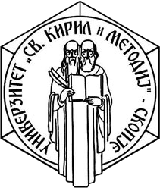Cloud computing (3+1+1)
Cloud computing (3+1+1)
Cloud computing postgraduate studies aim at top European education and training, which after graduation will be able to deliver scalable and resilient infrastructure, platforms and software, which are high quality and reliable and which meet the needs of local industry.
The cloud computing program is compatible with the respective studies offered at most of the world's universities that support this topic and provide student mobility.
- Name of the proposer: University "St. Cyril and Methodius University in Skopje, Faculty of Information Sciences and Computer Engineering - FINKI
- Name of the study program: Academic second cycle cloud computing studies
- Scientific-research area: 2 technical-technological
- Поле: 212 Computer Technology & Informatics
- Област: 21208 other
- The value of postgraduate studies is 60 ECTS credits .
- Duration of studies: 2 semesters .
- An academic year consists of two semesters lasting 30 weeks (1 semester = 15 weeks).
- Conditions for enrolling in the studies : The studies can be enrolled in cloud computing graduate students who have 240 or 180 undergraduate credits.
- Introductory layer : students who earned less than 240 credits during their studies a set of differential introductory courses is offered. After their successful realization, the student acquires the right to continue with the first semester of postgraduate studies.
- First semester: 2 compulsory subjects, 1 elective general education subject, 2 elective subjects in the field, one of which can be from the list of free elective subjects at UKIM.
- Second semester: 2 elective courses in the field, one of which can be from the list of UKIM (only if in the first semester the courses are selected at the faculty level) and completed project - master's thesis (18 ECTS)
- 1 ECTS credit corresponds to 30 hours of total work engagement
- The number of contact hours is 4
Acquired title: Master of Information Science and Computer Engineering in the field of cloud computing.
2. Introductory layer
The introductory layer is intended for students who study for less than four years or have earned less than 240 credits from previous studies.
Table 1: List of introductory layer items
|
|
code |
subject |
SEMESTER |
ECTS |
Prerequisite |
|
|
1 |
CSEW506 |
seventh |
VII |
6 |
Internet technologies |
|
|
2 |
CSEW705 |
seventh |
VII |
6 |
no |
|
|
3 |
|
Elective course 1 |
seventh |
VII |
6 |
|
|
4 |
|
Elective course 2 |
seventh |
VII |
6 |
|
|
5 |
|
Elective course 3 |
seventh |
VII |
6 |
|
|
6 |
CSES802 |
Cloud Virtualization and Computing |
eighth |
VIII |
6 |
Computer Network Design, Network Services Administration, Computer Networks, Internet |
|
7 |
CSES628 |
Service Oriented Architectures |
eighth |
VIII |
6 |
Internet programming |
|
8 |
|
Elective course 4 |
eighth |
VIII |
6 |
|
|
9 |
|
Elective course 5 |
eighth |
VIII |
6 |
|
|
10 |
|
Optional * |
eighth |
VIII |
6 |
|
* Course can be selected from the University list of free elective courses
Table 2: List of electives in introductory layer
|
|
code |
subject |
SEMESTER |
ECTS |
Prerequisite |
|
|
1 |
CSEW526 |
High performance computing |
seventh |
VII |
6 |
Computer architecture and organization or computer architectures |
|
2 |
CSEW513 |
seventh |
VII |
6 |
Computer Networks, Algorithms and Data Structures |
|
|
3 |
CSEW702 |
seventh |
VII |
6 |
None |
|
|
4 |
CSEW718 |
Distributed and parallel processing |
seventh |
VII |
6 |
Operating systems, parallel programming |
|
5 |
CSEW312 |
Multimedia Technologies |
seventh |
VII |
6 |
Introduction to IT or Fundamentals of Software Engineering |
|
6 |
CSEW515 |
seventh |
VII |
6 |
None |
|
|
7 |
CSEW514 |
seventh |
VII |
6 |
None |
|
|
8 |
CSEW522 |
seventh |
VII |
6 |
None |
|
|
9 |
CSES621 |
Parallel programming |
eighth |
VIII |
6 |
Advanced Software Development |
|
10 |
CSES602 |
Security of computer systems |
eighth |
VIII |
6 |
Operating systems |
|
11 |
CSES634 |
eighth |
VIII |
6 |
None |
|
|
12 |
CSES601 |
Administering IT systems |
eighth |
VIII |
6 |
None |
|
13 |
CSES618 |
eighth |
VIII |
6 |
Data and Computer Communications, Operating Systems |
|
|
14 |
CSES622 |
eighth |
VIII |
6 |
None |
|
|
15 |
CSES630 |
eighth |
VIII |
6 |
Computer Architecture and Organization or Computer Architectures |
|
|
16 |
CSES619 |
eighth |
VIII |
6 |
Databases |
|
|
17 |
CSES609 |
eighth |
VIII |
6 |
Data and computer communications |
|
After usOn completion of all ten courses and 60 credits, the student with previously acquired 180 ECTS credits (or completed three-year studies) continues with the courses from the second year of postgraduate studies.
Table 1: List of Postgraduate Courses
|
|
Name of the subject |
Status |
Семестар |
ECTS |
|
1 |
M |
winter |
6 |
|
|
2 |
M |
winter |
6 |
|
|
3 |
Elective general education subject * |
E |
winter |
6 |
|
4 |
Elective |
E |
winter |
6 |
|
5 |
Elective |
E |
winter |
6 |
|
6 |
Elective |
M |
summer |
6 |
|
7 |
Elective |
E |
summer |
6 |
|
8 |
Master Thesis |
M |
summer |
18 |
* Select one item from Table 2
Table 2. General education subjects
|
|
Code |
Name of the subject |
Status |
Семестар |
ECTS |
|
1 |
СЕ-E2-08 |
E |
winter |
6 |
|
|
2 |
ОО-M-01 |
Research Methods and Writing Techniques |
E |
winter |
6 |
|
3 |
СЕ-E1-04 |
|
E |
winter |
6 |



